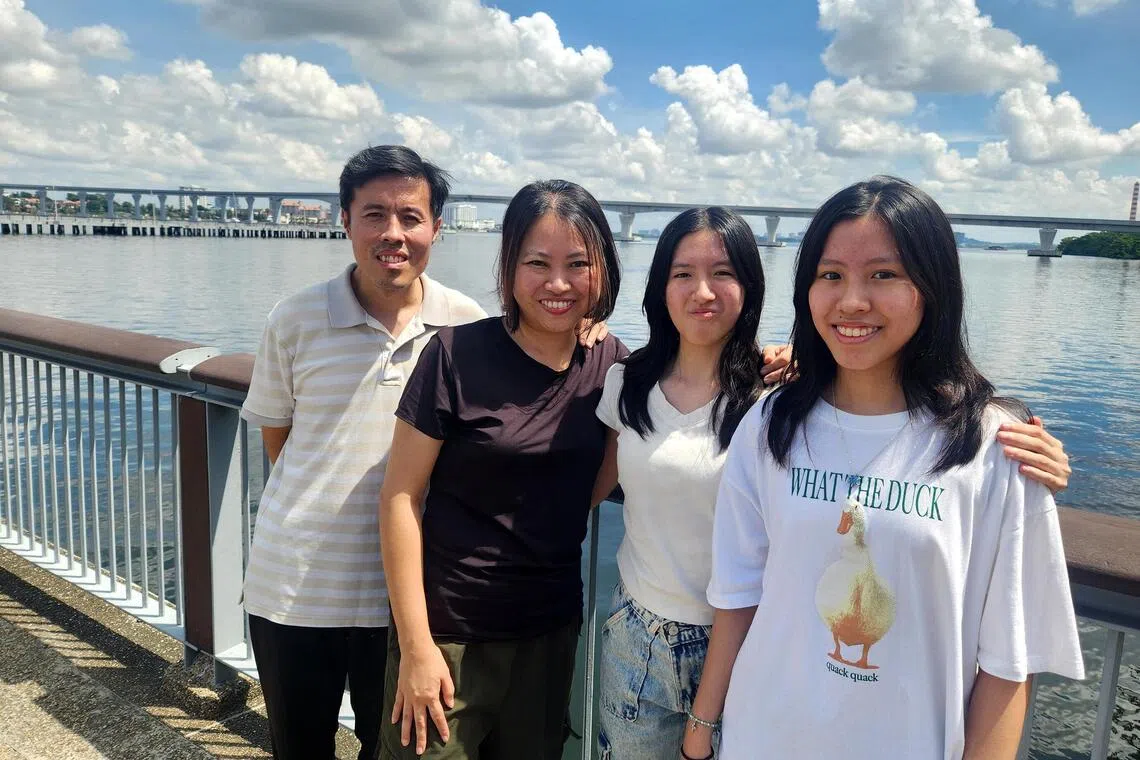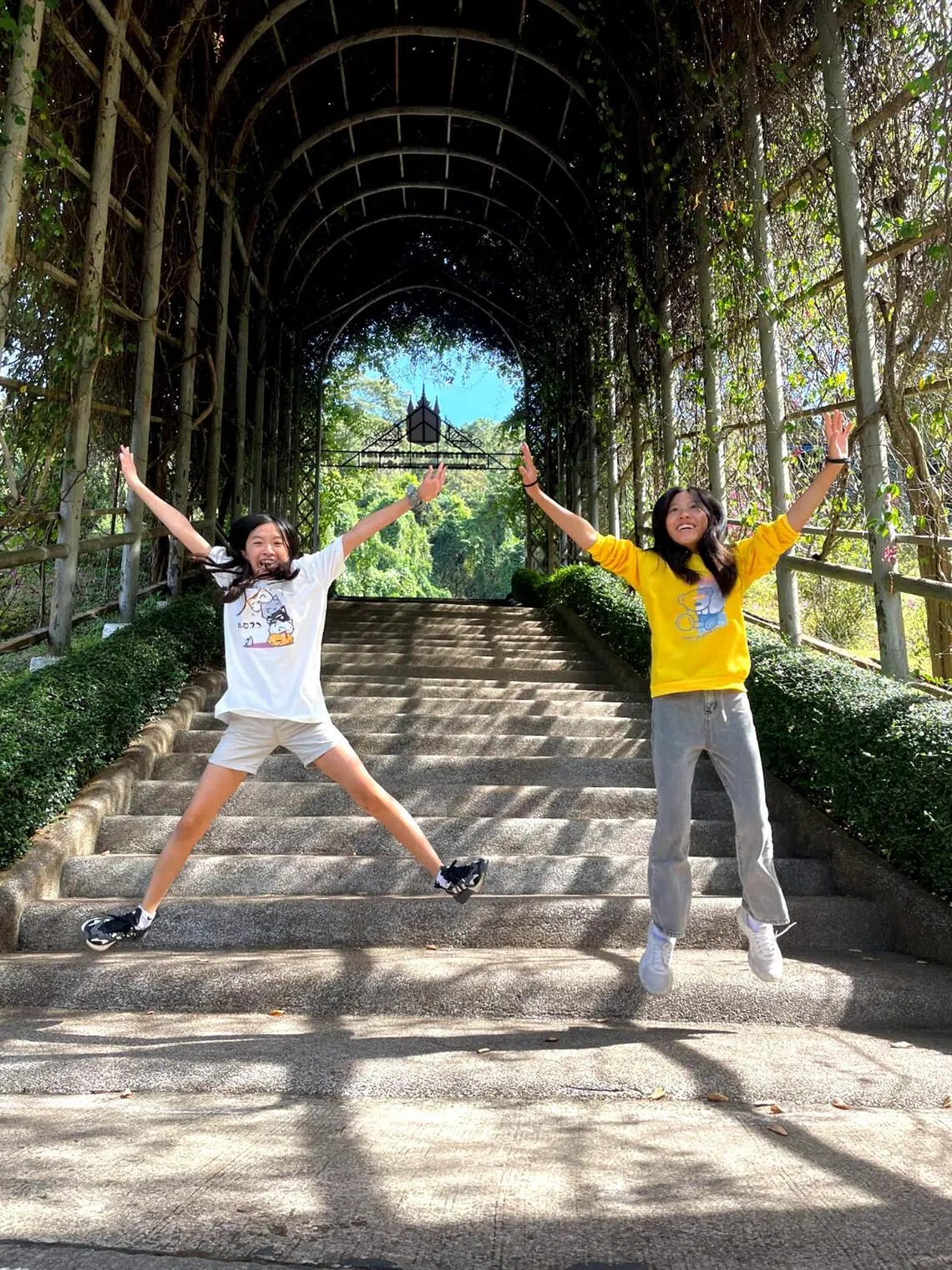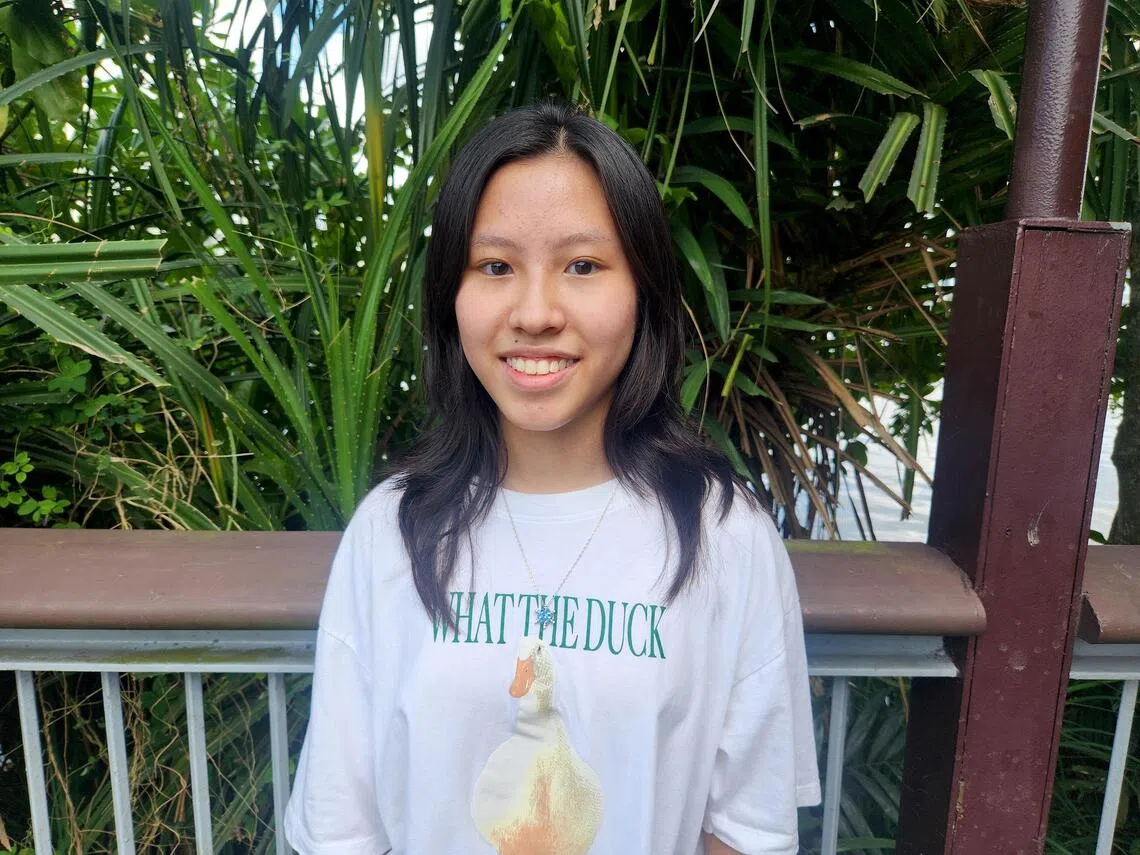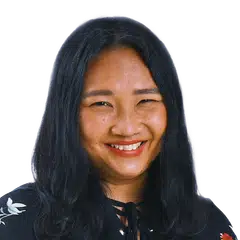Family steps away from Singapore’s education ‘arms race’
Sign up now: Get ST's newsletters delivered to your inbox

(From left) Mr Joash Liang and Ms Corrine Ang with their daughters Eleora and Elise. In pursuit of a slower, different lifestyle, they relocated first to Thailand, then to Malaysia in recent years.
ST PHOTO: VENESSA LEE
- Elise Liang struggled at an elite Singapore school, prompting her family to relocate to Thailand and Malaysia for a less stressful life.
- The family prioritised time together and a slower pace, with Ms Ang homeschooling her daughters and focusing less on academic achievements.
- Elise excelled in IGCSE Maths, achieving the world's highest score, validating their decision to pursue an alternative education and lifestyle.
AI generated
SINGAPORE – Elise Liang, 17, did not enjoy studying at her top-tier secondary school.
She found the transition from South View Primary School to Methodist Girls’ School (MGS) tough.
“It didn’t feel good that I was lagging behind. Because everybody there is very good academically, even if you’re doing okay, you feel like you’re not enough,” she recalls.
“I placed a lot of importance on getting good grades and had high expectations of myself. I didn’t do much apart from studying.”
She says she held back tears when she scored 50-something in her English examination at the end of Secondary 1 in MGS. Even though she scored 85 and higher for subjects like science and geography, she had shifted from being in the top class in Primary 6 a year earlier to languishing at the bottom of her Integrated Programme class, a six-year course that leads to an International Baccalaureate diploma.
Elise did not know it then, but a few months later, her parents would make the decision to uproot their family of four from Singapore.
It started when Covid-19 struck early in 2020, the year Elise sat the Primary School Leaving Examination.
Her mother, mathematics tuition teacher Corrine Ang, 44, had a revelation during the almost two-month circuit breaker, which was meant to curb the spread of the pandemic.
Ms Ang says: “I felt the circuit breaker was a very beautiful period in our lives, contrary to others’ experience. Even though it was Elise’s PSLE year, we spent most of the time playing Subbuteo (a table-top football game).
“It sparked the thought that maybe this was the way to do life together, having a lot of family time.”
Ms Ang is married to Mr Joash Liang, a 46-year-old service engineer, and they also have a younger daughter, Eleora, 13.
Slow living
By early 2022, the couple were ready to relocate elsewhere in South-east Asia to explore a different, slower way of life.
Ms Ang says: “It was making a decision to live as a family by forgoing materialism and comfort to smell the roses. I suggested it to my husband and he agreed very quickly because I think the desire was in us.”
The couple, who are Christians, reached the decision after praying about it. Within a month, they had packed, stopped work and rented out their five-room Housing Board flat in Choa Chu Kang.
Education not a priority
For Ms Ang, education was a “low priority”. She says: “I wanted to give the children the gift of time that I think was stolen from them by the education system.”
She knows of Singapore parents who hurry their children from school and enrichment lessons to having dinner and brushing their teeth before bed. Elise had little time to pursue her interests after focusing on schoolwork and her football co-curricular activity.
“I feel a lot of parents spend a lot of time being the timekeeper of their children. I don’t want to be that kind of parent,” says Ms Ang.
In her 20 years working as a tuition teacher, Ms Ang has encountered feelings of anxiety and depression in high-achieving students struggling to do even better; children with poor grades aiming to improve; as well as parents musing about how things would be different if only their children did better academically.
“I feel there’s very little joy in student life in Singapore,” she says, adding that chalking up one academic milestone after another provides only a transient satisfaction.
She ruled out international school when the family moved, first to Thailand in March 2022, then to Malaysia in November 2023. She says: “We didn’t want to impose another structure (of formal schooling); they could decide what to learn or do.
“We didn’t have any plans for their education. We trust that God has a plan for the children. It was a leap of faith.”
She had never worried about her children academically as both girls had regularly won Edusave awards in primary school.
In fact, she was surprised Elise felt she was struggling as she was on a scholarship in Sec 1 and 2.
Ms Ang says: “I didn’t know she felt she was doing badly because I was always so proud of her.”
When she and her husband sought their daughters’ views on leaving Singapore, Eleora, then aged 10, was delighted to be out of school, but Elise, then 13, was more cautious.
Elise recalls: “I was shocked at first, but because I was stressed from my Sec 1 exams, it sounded like a good break. I thought of it as a long holiday.”
She even asked her Sec 2 friends to send her study notes when she left.
Carefree days
After a brief stay in Chiang Rai, Thailand, the family settled in Chiang Mai in March 2022.
At first, the girls found the language barrier challenging, but the family eventually found a homeschooling community of Singaporeans in Chiang Mai.
Ms Ang homeschools Eleora, focusing on mathematics, while Elise studies on her own. Both girls use YouTube videos and follow the International General Certificate of Secondary Education (IGCSE) syllabus, an internationally recognised qualification similar to the O levels. The Cambridge IGCSE is taken in over 150 countries, typically by those aged 14 to 16.
Eleora will take her IGCSEs in the next two years. Elise, who took six IGCSEs in 2024, is studying for four A-level subjects.
Their days are free-flowing. Traversing Thailand on road trips that sometimes comprised 12-hour journeys, they explored attractions like Tham Lod cave in northern Mae Hong Son province, and the “sticky” Bua Tong waterfall in Chiang Mai. The waterfall is known for mineral deposits producing a non-slip surface that allows visitors to climb it.

Sisters Eleora (left) and Elise Liang on a family road trip from Chiang Mai to the town of Pai in northern Mae Hong Son province in 2022.
PHOTO: COURTESY OF CORRINE ANG
The girls usually study for three hours daily and the rest of the time is spent pursuing their interests.
Eleora started A Little Ripple, a business selling pickleball equipment, with her mother in 2022, and takes violin lessons. Elise has been giving mathematics tuition since the end of 2024.
Ms Ang describes her and her husband’s daily routine as idyllic. The couple, who are not working, hike and explore waterfalls, hot springs and other nature spots; sip drinks at coffee shops; play sports and spend time with their children.
Being with the family all day brings them “so much joy”, says Ms Ang.
“We are creating memories together. Instead of waiting until you retire, you can enjoy life with your spouse and your children.”
She cherishes simple pleasures and two-hour mealtimes where the family talk about anything under the sun. One of her treasured memories is of Elise giving Eleora a piggyback ride as a birthday present while under quarantine in a hotel when they arrived in Thailand during the pandemic.
Lower costs of living
The family live simply on around $3,000 a month, “less than half” of what she and her husband used to earn, says Ms Ang. This used to be the rental income from their flat, which they sold in 2024.
She says: “We feel that leaving Singapore upgraded our standard of living, since we previously lived in a five-room HDB.”
They rented a two-storey, 265 sq m house in the San Sai suburb near Chiang Mai for 20,000 baht (S$790) a month. They were part of a residential community that had access to a swimming pool, gym and garden, where they grew vegetables.
A top global award
The family moved to Ipoh, Malaysia, in 2023, where they have lived since, visiting Singapore every month or so.
In 2024, Elise sat six IGCSE exams as a private candidate. She took English, mathematics, additional mathematics, biology, chemistry and physics in two rounds of tests in June and November.
Her perfect score in mathematics won her an Outstanding Cambridge Learner Award from examination body Cambridge International Education. The certificate noted that she had gained “the highest mark in the world” for Cambridge IGCSE Mathematics (Without Coursework) for the June 2024 exam. Her lowest score was 91 for English.
The good news was received rapturously, not least by members of their extended family, who had objected to their decision to move overseas.
Mr Liang says: “Our parents were understandably concerned that we might ruin the children’s education pathway to success.”
Thinking the couple were making a wrong choice, they did not want Mr Liang and Ms Ang to take the children out of school.
“Elise’s award proved them wrong, and showed them that a success route out of the traditional education system is possible. They no longer seek to dissuade us from this route less travelled,” he says.

Elise won a top global award in the IGCSE Mathematics examination in June 2024.
ST PHOTO: VENESSA LEE
Elise, who is studying A-level further mathematics on her own “for fun”, was elated to get the accolade, but the joy eventually faded.
She agrees with Education Minister Desmond Lee, who said in Parliament in late September that Singapore must do more to break away from seeing education as an “arms race”
While she feels there have been improvements in the education system, she hopes for a “mindset change”.
In secondary school, she recounts that her competitive mindset made her feel stupid as she was comparing herself with others.
She says: “It placed pressure and stress on me and made me doubt my worth. In Singapore, my decent grades were all that I had.
“Previously, I felt that everything was just a meaningless chase (after academic achievements). Do well in your PSLE, your A levels, get into a Singapore university, do internships, get a good job, save up and then retire.”
She adds: “Ever since we moved from Singapore, I realised that achievements aren’t everything. Homeschooling gave me time to explore my interests and I found my value outside of academics. I found my happiness through the simple and slow-paced life.”



